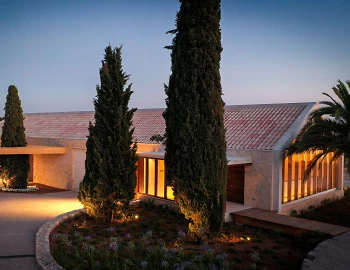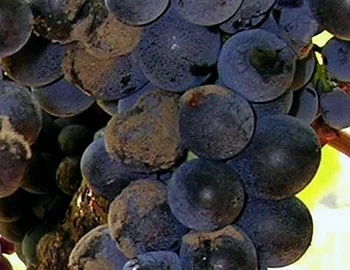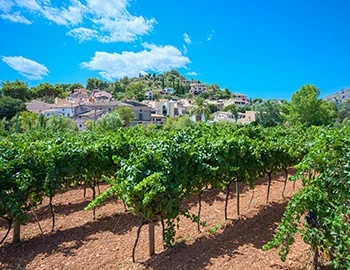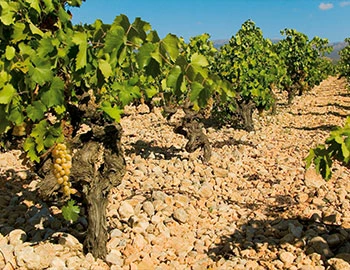Desconfío de la gente que no bebe 2022
VdT, Ribas, 750 ml

| Grape variety: | Mantonegro |
| Producer: | Bodegas Ribas |
| Origin: | Spain / Mallorca |
Description
"Never trust a man who doesn't drink", Humphrey Bogart allegedly once said - and that's exactly what this wine is called, only in Spanish. Admittedly, after the first sip, resistance is futile anyway: this wine envelops the palate with such warmth, flavour and softness that you'll gladly let yourself be carried away! The nose is full of cherry, strawberry, blackberry and plum fruit, paired with liquorice and distinctive balsamic notes. Velvety on the palate with ripe tannins. Limited availability!
The Winery of the Year 2024/2025

Bodega Ribas Mallorca is our Winery of the Year until April 2025!
Just 22 kilometres from Palma de Mallorca, in the picturesque village of Consell, the family-run Bodega Ribas has been growing wine for more than 300 years. Over the next twelve months, Bodega Ribas will accompany us with its Mediterranean charm as Winery of the Year and take us on a sensory journey to the marvellous Balearic Islands.
Attributes
| Origin: | Spain / Mallorca |
| Grape variety: | Mantonegro |
| Label: | Vegan, Certified organic or biodynamic wine |
| Ripening potential: | 2 to 8 years |
| Drinking temperature: | 16 to 18 °C |
| Food Pairing: | Spicy hard cheese, Saddle of lamb fillet with herb jus, Wild fowl, Cold fish dish, dried meat, Roast saddle of venison |
| Volume: | 15.0 % |
| Note: | Contains sulphites |
Bodegas Ribas
We could talk about our winery of the year, Bodega Ribas on Mallorca, all day long. But it's best to see and read for yourself! We sent wine journalist Britta Wiegelmann and cameraman Felix Groteloh to experience the winery and the family at first hand. Araceli and Javier Servera Ribas, the brother and sister team behind the wines, tell us how the oldest existing winery on the island survived phylloxera, why they love their local grape, the Mantonegro, so much and what the sea has to do with it all.
For 300 years, the Ribas winery in Consell, a village of 4000 people just a stone's throw from Palma, has been cultivating a real treasure: ancient indigenous grape varieties such as Mantonegro, Gargollassa, Callet, Prensal blanc and the rare Giró Ros. These grapes can only be found here – and who could offer them a better home than the oldest bodega still in existence on the island? Pedro Ribas planted the first vines in 1711, and today the vineyards cover 40 hectares at around 150 metres above sea level with sandy and calcareous, sometimes very stony soils that are cultivated organically.

Mantonegro
The prince of Mallorca
The word “negro” – black – in this variety’s name is misleading. It refers to a red wine grape, and a relatively light one at that. Some grapes even shimmer more pink than red. The Manto negro is the most important variety, and a real native, of the holiday island of Mallorca. It yields bright-red, soft wines with plenty of alcohol and an unusual bouquet of blackberry, fig and pomegranate. A small amount of Callet – a slightly stronger Mallorcan variety – is usually added to lend it structure. Wines from Manto negro are well suited for barrel maturation, especially if they come from old vines. These provide particularly concentrated musts that are full of character.

Mallorca
Mallorca: new premium wines from old varieties
The party island is showing an entirely different, more delightful side: every year, more premium wines are produced in Mallorca. While international varieties like Chardonnay, Cabernet Sauvignon and Merlot yield excellent wines in Mallorca’s terroir, top winemakers increasingly use the best native varieties, such as Manto Negro, Callet and Prensal Blanc. The results are independent wines with Mediterranean charm and surprising freshness.

Spain
Spain – Variety and perfection
“Somewhere in la Mancha, in a place whose name I do not care to remember...,” begins Don Quixote's odyssey.
The most famous part is definitely when Don Quixote thinks windmills are his enemy and wants to fight them – until they nearly kill him. It’s possible there was a bit too much of the La Mancha wine at play. Spanish vines fight for their survival in rugged landscapes, battling fierce drought and rough soils. But they fight well.



